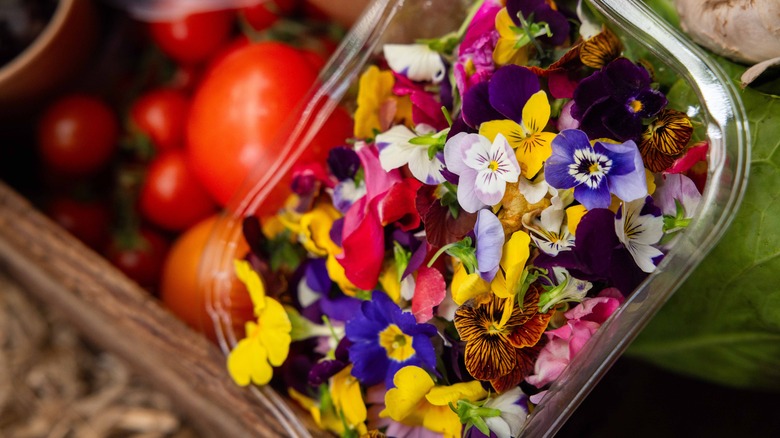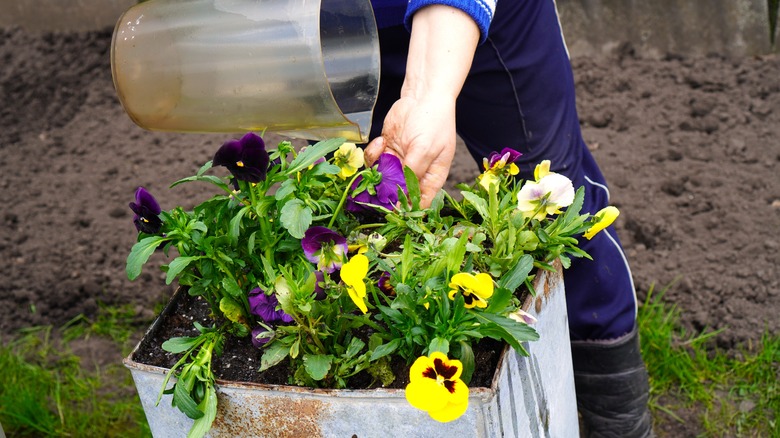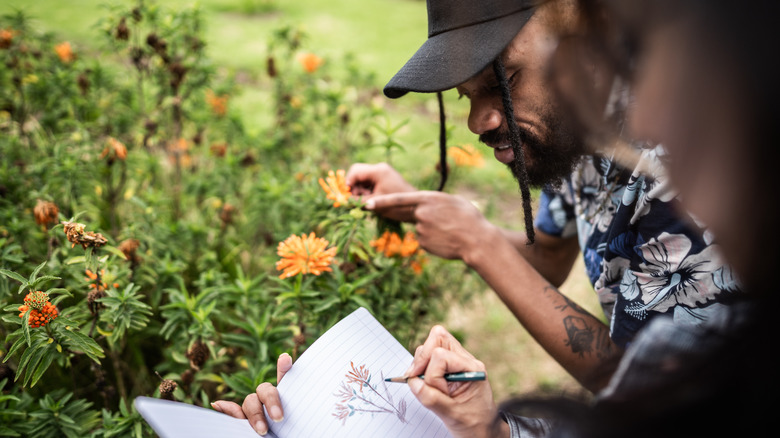Our Expert's Tips To Ensure That The Edible Flowers In Your Garden Are Safe To Eat
There are dozens of delicious edible flowers you can grow in your garden, but growing flowers intended for consumption isn't as simple as planting and picking. If you're an aspiring edible flower aficionado, there are some key factors you'll need to consider to make sure your flowers are safe to eat. In an exclusive interview with House Digest, Kim Zimmerman, head designer, grower and owner of Rowdy Poppy gave us her advice for growing edible flowers that will delight your taste buds without risking your health. "Generally speaking, if you're being careful about what you put in and on your garden, your flowers should be safe to consume," says Zimmerman. Her biggest tips for gardeners are to research their plants and, "Definitely avoid any chemical pesticides or herbicides in your edible gardens and nearby."
Growing edible flowers can be a brilliant way to bring color to your garden and your dinner table, with roses, chamomile, pansies and marigold being just some of the most popular options. But if you're going to grow edible flowers, you must be careful not to risk your health in the name of culinary curiosity. Here's why Zimmerman says it's important to stay away from pesticides and herbicides and thoroughly research your edible flowers, plus her tips for protecting your tasty blooms without the use of toxic chemicals.
Keep your edible flowers free from toxins
As a general rule of thumb, make sure anything near your flowers is totally safe to ingest. "You'll need to control your environment as much as you're able ... As mentioned, pesticides and herbicides are a no-no." In her exclusive interview with House Digest, Kim Zimmerman warned readers to be aware of their less immediate surroundings too: "If you know your neighbor is spraying glyphosate, for example, then you may want to ensure your edible garden is far from that property line." Even with organic gardening products, you'll need to carefully read the labels and be wary of ingredients. "It is important to note that composts and fertilizers made from human waste (biosolids) rather than animal and plant waste can definitely be used for gardening but not for growing crops you would ingest," says Zimmerman, "They still carry a risk of transmitting pathogens, so it is the safest choice to avoid these on any food crops."
Luckily, many edible flowers are relatively easy to grow with just water and sunshine, although they can be damaged by pests. Without any pesticides, you'll need to lean into more eco-friendly ways to keep bugs out of your garden. Zimmerman suggests, "This is your chance to use integrated pest management techniques such as literally plucking any destructive pests (like Japanese beetles or grasshoppers), spraying off aphids with a hose or introducing hungry ladybugs, or setting beer traps to manage slugs."
Get to know your garden flowers
Staying away from toxic chemicals may seem obvious to some, but edible flowers themselves can also present some unique risks. In her exclusive interview with House Digest, Kim Zimmerman warned readers never to play roulette in their garden. Whether you're familiar with several edible flower species or you're just starting out, she recommends that gardeners, "Do your research, truly. Purchase a book on edible flowers and ensure it is written by a reliable source." A good book won't just help you identify edible flowers, but also avoid the inedible and potentially toxic parts. "Toxicity in plants can vary by plant part (e.g., stems versus leaves versus flowers) and also by the maturation level (e.g., some plants are toxic when young and not when mature and vice versa)," said Zimmerman.
Just because a plant produces edible parts doesn't mean that the flowers are always safe to eat either. For example, there are lots of nightshade vegetables perfect for your garden, but many nightshades have flowers that are notoriously poisonous, such as potatoes and tomatoes. When in doubt, "It's best to stick with reliable edibles and not venture too far into rarer or less known flowers; there are so many wonderful and well-known ones," Zimmerman notes, "Have fun with your edible flower garden! You'll be amazed at the variations of flavor you can discover and how much they can elevate your meals and drinks."


